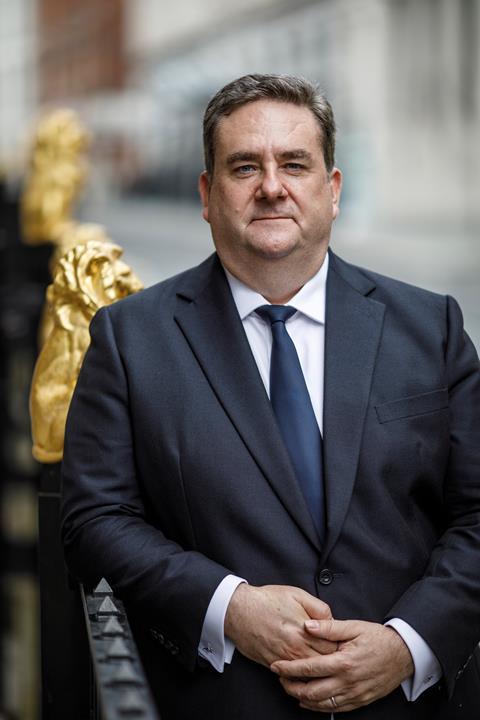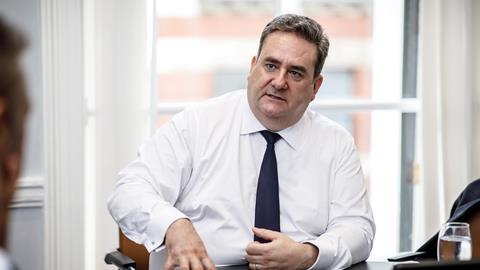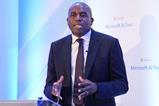New Law Society president Nick Emmerson tells Paul Rogerson what it means to be a solicitor
Born
North Yorkshire
Education
State secondary school; BA Politics and East Asian Studies, Newcastle University; College of Law, York
Career
2021-present – Corporate M&A partner and head of capital markets, Lewis Mathys Emmerson
2013-2020 – partner, Gateley, Leeds
2007-2013 – partner, Eversheds, Leeds, Hong Kong, Shanghai and London. Managed the Shanghai office. Founding partner of Hong Kong office
2004-2007 - associate, Eversheds, Leeds
2000-2004 – associate, Herbert Smith, Tokyo and London. Founding member of the Tokyo office
1997-2000 – trainee and solicitor, Denton Hall, Tokyo and London
Roles
President, Leeds Law Society, 2020-21
Council member for Leeds, Law Society of England and Wales, 2015-
Known for
President of the Law Society of England and Wales, 2023-24
After its first Black president (I. Stephanie Boyce, 2021), and first Asian and Muslim president (Lubna Shuja, 2022), the Law Society appears to have reverted to stereotype with City dealmaker Nick Emmerson. But appearances can be deceptive. Emmerson’s profile is also a notable departure from the norm in its own way.
A Japanese speaker since his college days, the corporate M&A and capital markets specialist has spent much of his career living and working in east Asia. Indeed, at Eversheds he once flew into Shanghai more than 50 times in two years while managing an office there. ‘I got birthday cards from the plane crew,’ he jokes. ‘That’s what happens when you fly too much.’
Emmerson has worked for a quartet of City firms since he qualified a quarter of a century ago. In that time he has shuttled between London, Hong Kong, Tokyo, Shanghai – and Leeds in his native Yorkshire. He has founded offices in Tokyo and Hong Kong. Today, he is to be found at boutique M&A firm Lewis Mathys Emmerson, where Steve Lewis, his boss at Denton Hall during his second seat as a trainee, is managing partner.
Emmerson concedes he is an unlikely Law Society Council panjandrum. ‘As a white man doing corporate work in the City, I used to think there wasn’t much reason to engage with the Law Society, which seemed to be a vehicle for special interests,’ he told me candidly last week.
So what changed? Eight years ago he was asked by the then regional representative for Yorkshire to consider standing for Council. Upon closer investigation, his interest was piqued. ‘Initially, I was intrigued just to find out what was going on in this place and to see what work was being done,’ he explains. ‘I decided to put myself forward because the organisation does do good work, but I thought it needed to engage more in the international sphere, in the City sphere, but also regionally as well.

‘The reason I invest my time here is that the Law Society does something that is quite unique. It can get audiences with ministers far more easily than a managing partner at a top law firm, for example. And it brings solicitors together in a coordinated, sensible way as the collective voice for the profession.’
This observation feeds in to the first of three priorities for his year-long tenure, which can be encapsulated as ‘know your own strength’.
‘We don’t blow our own trumpet enough,’ says Emmerson. ‘The fact that there are 220,000 solicitors – 160,000 practising – when there are only 17,500 barristers and 17,500 legal executives is remarkable. We don’t realise how powerful and influential we are. We are present in every high street, town and city, providing on-the-ground access to justice in difficult circumstances. There is a value to society in that. We have a lot to shout about.’
In tandem with this societal heft must come a holistic view of the profession that very much stretches nationwide (or nations-wide, more precisely, as this is the Law Society of England and Wales). For Emmerson, the growing perception of London as an island ‘entire of itself’ – a de facto city state – is problematic.
‘[Mayor of London] Sadiq Khan has said: “[London’s] competitors, I say this not in any way to cause offence, aren’t Manchester, Birmingham, Cardiff, Glasgow. Our competitors are Hong Kong, Singapore, New York.” So you have that outward-looking face that London should have, and must have. But sitting behind London are the great regional cities that see London as their capital.
‘The issue for me is, when did London stop being that capital city? Where we all share in the wealth, prospects and opportunities which arise in London? There is a Law Society, for example, in London that belongs to everybody – not just the City or a select group of people in the south. It’s about “looking up” the country and seeing what’s going on.’
He adds: ‘The Industrial Revolution did not take place in London. Our members provide good jobs [in the regions] and a powerful spur to the economy. But they also provide expertise, and not just in the law, but also knowledge of local economies. We need to harness the powerhouse that is the regions, especially in the post-Brexit era.’
But what does this mean in practical terms? I remind the president that the Law Society closed its regional hubs some years ago. ‘That’s one reason I got elected president,’ Emmerson laughs. ‘I made a fuss about that!’
He adds: ‘We [the Law Society] need to look overseas, we have to do that bit. We also need to turn around and look at what we’ve already got in the regions. Some City partners, for example, spend one or two days a week in their firm’s regional offices anyway. With people working from home as well, the whole environment is much more fluid. It’s about having [solicitors] in the regions feel part of this story.
‘International doesn’t just mean the City. DLA Piper comes from Sheffield [predecessor firms Dibb Lupton & Co and Sheffield firm Broomheads merged in 1988]. Eversheds started in Birmingham and Leeds. Squire Patton Boggs was a Bradford firm [Albert Victor Hammond set up a predecessor firm in the West Yorkshire city in 1886].
‘That needs to be recognised. Yes they are City firms, but they are not just City firms.’
'We don’t blow our trumpet enough… we are present in every high street, town and city, providing on-the-ground access to justice in difficult circumstances. There is a value to society in that. We have a lot to shout about'
Emmerson’s third priority builds on the theme of his predecessor Lubna Shuja’s presidential term: ethics. From the Post Office Inquiry to SLAPPs, from Russian sanctions to media stings on allegedly unscrupulous immigration lawyers, how solicitors go about their business is under unprecedented scrutiny.
Last month Chancery Lane launched a professional ethics web hub as part of its three-year programme to support solicitors seeking to balance their obligations to clients and wider society. Matthew Hill, chief executive of the Legal Services Board, has gone so far as to suggest that solicitors be required to take a version of the doctors’ Hippocratic oath to help to cement their commitment to acting ethically.
‘We need to consider what it is to be a lawyer, a solicitor,’ Emmerson asserts. ‘Because at the moment we focus a lot on clients, and we seem to define ourselves by our clients. But that’s not quite right. Yes, we have to represent clients with all our vigour and all our might. But we advise clients, we work for them and not with them.’
Emmerson explains the distinction by alluding to the Japanese honorific sensei, literally meaning ‘born earlier’, which is used to refer to or address lawyers, teachers, doctors, and other authority figures. Doctors, teachers and lawyers are viewed as the three ‘pillars of society’, he stresses.
‘Look at our society, and doctors and teachers still pretty much have that respect. But do lawyers? Do solicitors? It’s about more than just doing the pro bono. It’s about how you professionally conduct yourself on a daily basis and what that means. What it is to be a solicitor and the role of the Solicitors Regulation Authority in policing that role.’
He adds: ‘What it means to be a legal professional, I think, is that we do have duties to the court, we do have duties to society. Yes, we do have duties to our clients, but we should not be defined by them.
‘We tell people this in the admissions ceremony for the Law Society, that clients will sometimes ask you to do something that’s wrong, that you don’t feel right about. Don’t let them do that. Stop, because ultimately your actions define the rest of us. It may seem a bit of a minefield, but in reality we all know in our heart of hearts what it is to be a professional and to give professional advice. It’s all about knowing where the boundaries are.
‘So what is that innate characteristic that we have as legal professionals? We all know what that is. Writing it down might be a good idea and helps with codification, but we all know right and wrong. So I think that if people do step over that boundary, they are doing it to help their client. But that does not make it right.’
'What it means to be a legal professional is that we do have duties to the court, we do have duties to society. Yes, we do have duties to our clients, but we should not be defined by them'
The overarching question, Emmerson stresses, centres on which moral compass solicitors should be following. A particular concern is the sphere of litigation, and examples of more aggressive styles and approaches.
So how can such behaviour be changed, and solicitors best educated as to the location of those boundaries? Emmerson calls to mind the great jurist Tom Bingham’s short but seminal book The Rule of Law, published in 2010. Amplifying his much-quoted Williams lecture of 2006, Bingham wrote in his chapter on a fair trial: ‘Scarcely less important than an independent judiciary is an independent legal profession, fearless in the representation of those who cannot represent themselves, however unpopular or distasteful their case may be.’
‘He [Bingham] says very clearly that independent legal professionals are required to fearlessly advocate for their client, whether or not they agree with what they do. Our job is making sure clients have representation. The “twist”, though, is that the client shouldn’t tell us what to do. We represent them. We advise them. It’s not a case of them “directing” us, if you like.’
The same principle applies to in-house lawyers equally, of course – a fact that has not been lost on counsel representing unjustly convicted postmasters in the Post Office Inquiry. Earlier this year, a group of general counsel complained to the SRA that its latest review of the sector was ‘unduly optimistic’ with regard to the ethical challenges faced by employed solicitors and pressure to compromise on their regulatory obligations.
Emmerson says: ‘You have to ask the question: what is it I prize most – being an employee or being a professional? And the answer is, I hope, you prize the fact that you are professional. We must give support to in-house lawyers so that they are able to turn around to their employers and say – “I can’t do that”.
‘The profession is blurring the back-to-basics of what it means to be a lawyer and that can make it very difficult for people.
‘I think that is an issue we have to try and clarify and make sure solicitors know where they stand – especially when they are being attacked and called “lefty lawyers”. And that’s where the ethics come in.’
Complementing this is the Law Society’s pioneering Framing Justice project (see last week’s Gazette), which aims to change the way the public and decision-makers shape the legal profession. That is a daunting task and will likely take years – but it is an urgent one. Chancery Lane surely deserves credit for grasping the nettle.





































2 Readers' comments